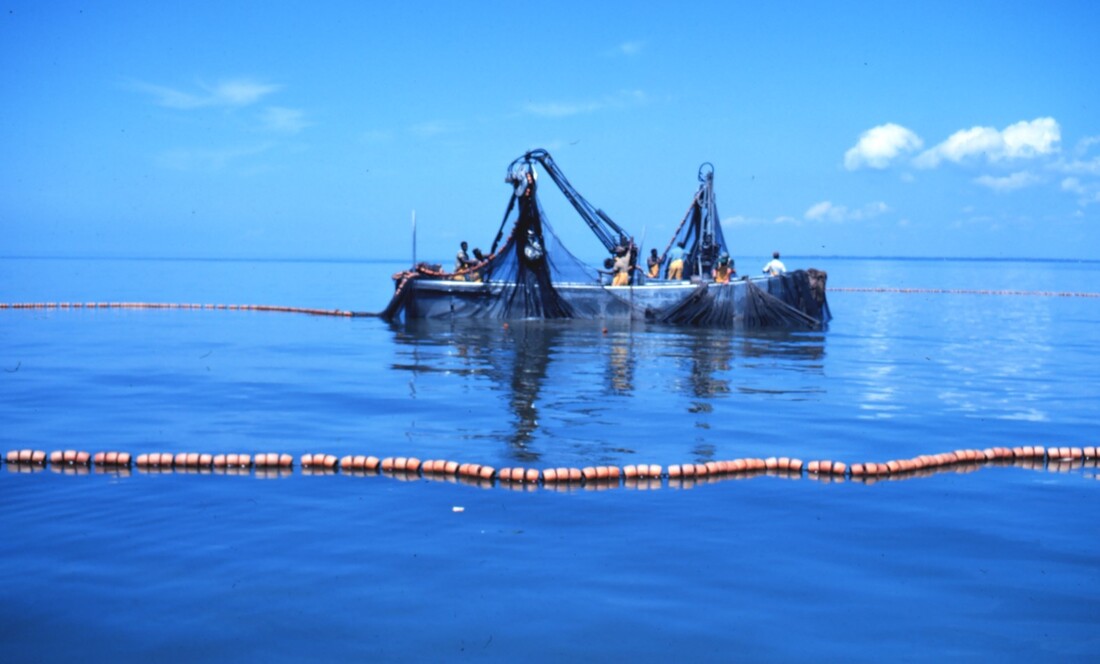|
Purse seine boats encircling a school of menhaden. Photo by Robert K. Brigham from the NOAA's Fisheries Collection. A number of organizations called on the Atlantic States Marine Fisheries Commission (ASMFC) to follow through on efforts to help protect a crucial fish species. That effort was rewarded on Oct. 28 with a vote by ASMFC's Atlantic Menhaden Management Board to reduce the Atlantic menhaden quota by 10 percent. The decision established a quota of 194,400 metric tons for the 2021 and 2022 fishing years. Atlantic menhaden are a primary food source for numerous sportfish populations, especially striped bass. Menhaden have been called the "most important fish in the sea." In the bays and estuaries of the east coast they create a vital connection between the bottom and top of the food chain. They eat tiny plants and animals and are a rich food source for many predator fish — including rockfish (striped bass), bluefish, and weakfish, as well as ospreys, bald eagles, dolphins, and whales. Menhaden migrate along the Atlantic coast from Florida to Maine. ASMFC, an interstate governing body manages the fishery for the 15 states that share the coastline. Earlier in the year, ASMFC adopted a new method for determining how many menhaden can be taken because of their importance in the food chain and because of the increasing pressure being placed on the species by industrial fishing companies that have been strip-mining menhaden for reduction to food for people and animals, supplements such as fish oil, bait for fishing, and ingredients for products such as lipstick. The American Littoral Society and partner organizations followed the decision to adopt the new method with a call for the Commission to follow through on that visionary decision by implementing "this new system by setting a coast-wide catch limit that is likely to succeed" in helping menhaden to return to sustainable levels. Read the letter below. - - - Dear ASMFC New Jersey Representatives,
Today the undersigned ask New Jersey’s delegation to the Atlantic States Marine Fisheries Commission to demonstrate conservation leadership when voting to establish the 2021-2022 coast-wide Total Allowable Catch limits for Atlantic Menhaden at the upcoming Atlantic Menhaden Management Board meeting on October 20th. Atlantic menhaden serve as forage for striped bass, bluefish, weakfish, summer flounder, bluefin tuna and other species that drive the recreational fishing economy in the state of New Jersey, as well as whales, dolphins, birds that contribute to ecotourism activities. The Atlantic States Marine Fisheries Commission’s visionary action in August 2020 to adopt Ecological Reference Points for Atlantic menhaden management was an important acknowledgement of the key role menhaden play in the ecosystem. Now, at its October meeting, the Commission must effectively implement this new system by setting a coast-wide catch limit that is likely to succeed in meeting the new ecological target. Specifically, we request that the New Jersey delegation to the Atlantic States Marine Fisheries Commission advocate and vote for a 2021-2022 Total Allowable Catch limit (TAC) that the Commission’s own scientific advisors predict will have no more than a 50% probability of exceeding the newly adopted Ecological Reference Point Target Fishing Mortality. Given the poor condition of other forage species, especially Atlantic herring, the Board should adopt an additional conservation buffer to assure adequate forage for striped bass and other species. According to the Atlantic Menhaden Technical Committee, the TAC that would lead to a 50% probability of exceeding the new ecosystem target fishing mortality rate for 2021-2022 (combined) is 176,800 mt per year. While this TAC represents an approximate 18% reduction from the current 216,000 mt TAC, it is similar to the TACs implemented for 2013-2014 (170,800 mt) and for 2015-2016 (187,880 mt). Setting the Total Allowable Catch at this level or lower would better position forage fish availability to facilitate the coast-wide recovery of striped bass, bluefish, and weakfish to their target levels. There are many reasons that New Jersey State delegation to the Atlantic States Marine Fisheries Commission should not consider Atlantic menhaden catch limits that have less than a flip of a coin chance of maintaining fishing mortality rates at or below the newly adopted Ecosystem Based Reference Point target, not the least of which is that doing so would be inconsistent with the leadership that the New Jersey State legislature and Governor Murphy have already taken on conservation. We thank you for your ongoing managerial leadership and we look forward to collaborating with you to rebuild striped bass and other key species managed by the ASMFC. Sincerely Fred Akers Administrator Great Egg Harbor Watershed Association Benson Chiles Board Member Founding Fish Alliance Tim Dillingham Executive Director American Littoral Society Paul Eidman Menhaden Defenders Founder JCAA Forage Fish Chairman Hi Mar Striper Club
Tom White
11/2/2020 08:02:08 pm
Go to it! Comments are closed.
|
Archives
July 2024
Categories
All
|


